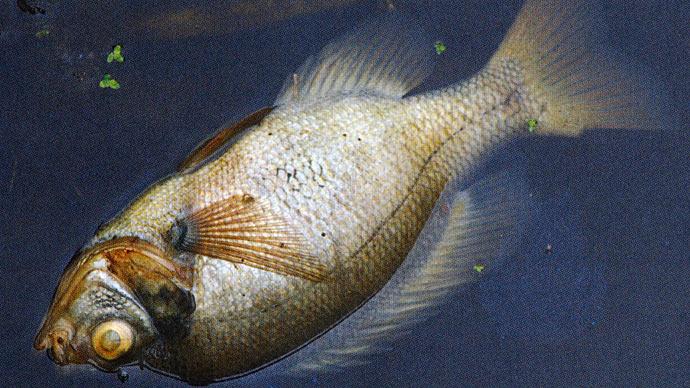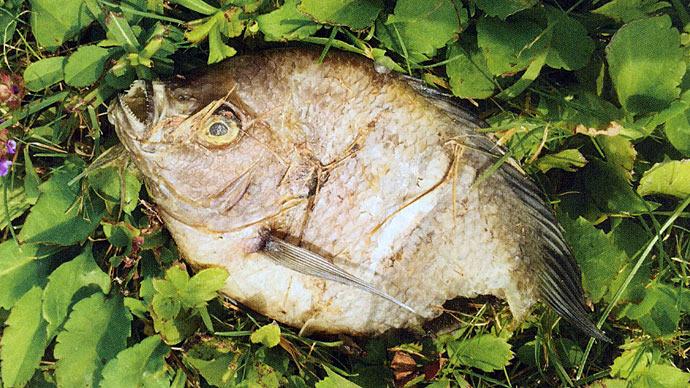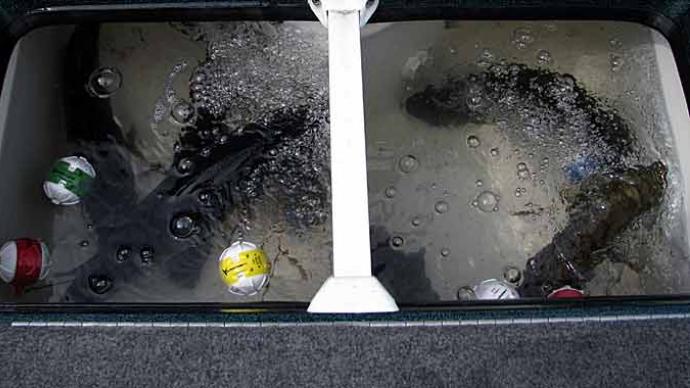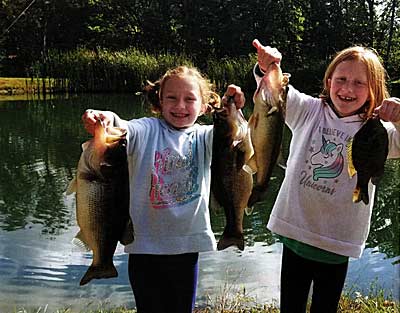
Friday, May 28, 2021, is a day Chuck Brinkmann will remember for a long time.
What was the beginning of a Memorial Day weekend of fun and relaxation was anything but. He'd had a long week, just pulled into the driveway, looking forward to a great weekend, when he saw something quite disturbing.
Chuck and his family live in Union, Missouri. A self-employed cabinet maker, Chuck works hard and loves his wife and their two daughters. They are living their American Dream.
In June 2016, Chuck closed the dam on a brand-spanking-new 3/4-acre pond just behind their home. He wants his girls to grow up chasing frogs, catching fish, being in awe of fireflies, studying dragonflies, and hearing all the different outdoor sounds, from crickets to coyotes to wood ducks.
Rains came, and the pond level rose, capturing water from the nine-acre watershed surrounding them. Some acres are woods, boasting mostly post oaks and some hickory. The rest is pasture—home to two mules, Brownie and Beulah, their neighbors.
In October 2016, Chuck stocked fathead minnows, bluegills, redear sunfish, and some channel catfish. He got that recommended mix from famed Osage Catfisheries near Lake of the Ozarks.
How many of us have stocked the same mix or similar?
Chuck trades at Straatman Feed & Transfer in Labadie, Missouri, about 15 miles away. He'd stocked his fish and wanted to feed the little darlings to speed up the process and grow some healthy fish. So Straatman turned him on to Purina's high-protein AquaMax Sport Fish line of fish foods. He bought a bag, read the directions on the back, and started his feeding program. The fish responded quickly and grew fast and fit. Thick shoulders and deep bellies became his standard.
Fast forward a year, and he stocked recommended numbers of Largemouth bass fingerlings from Osage Catfisheries.
I met Chuck at Straatman's about two years later. He was my guest on one of the early Facebook Live broadcasts I try to do each Wednesday. He was excited about his pond and how fast fish were growing. After seeing some of his pictures, I was excited for him.
After that broadcast, Chuck stayed in touch, texting me, sending photos of his fish, and being a regular viewer/participant on my Wednesday shows. It's common for Chuck to post a question during the broadcast.
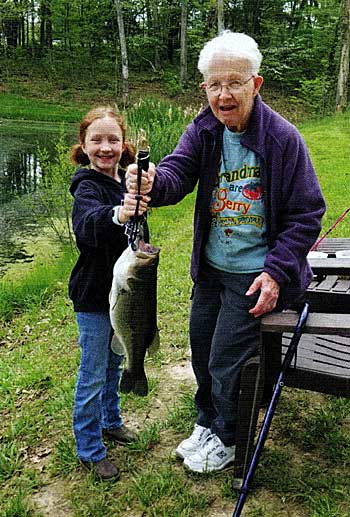
His pond matured, just like yours has—or will. One huge thing about Chuck's Pond was how big his fish grew and how fast. He is now in Year 5, and some channel catfish are well into double-digits. Bluegills are exceptional, and even a few of his bass have mastered the consistency of his feeding plan and are conditioned to eat fish food. His best bass are beasts, much larger and healthier than one might expect in a pond of such size.
To say, "He feeds his fish" is a gross understatement. He feeds his fish to satiation pretty much every day.
As time has moved on, I'd caution him. "What do I need to do?" He'd ask about water and fish and feed and harvest. He's an inquisitive sort. So my advice to him is the same I offer you and every pondmeister with small waters.
"Pay attention to your water."
I even coined the term "Happy Water." If your water isn't happy, your fish won't be, either.
Back to May 28. The Queen and I were babysitting our two most energetic grand-peeps, hanging out at their house as their parents celebrated their anniversary in some exotic resort spot in Florida, eating good food, watching gulf waves lap onto the shore, and sipping beverages sans the little umbrellas...or their sweetheart kids. At base camp, after supper (which they didn't eat), we watched Paw Patrol, trying to get a six-year-old and his little acrobatic three-year-old brother to stop jumping from the couch to the coffee table and turning backflips into my lap. It was getting close to bedtime...read them a book, say the Lord's prayer, and hope they got the message that it was time for sleep. About halfway through the second episode of Paw Patrol on that Friday night, my cell phone rang. The Queen took another sip of wine.
I looked at it. "Chuck Brinkmann." It's Friday. It's a holiday. I've got a lap full of rambunctious boy clones. The Queen looked and said, "Do not take that call...I'm serious."
My mind briefly processed the less-than-veiled threat.
The left side of my brain said, "She's right, don't take any calls."
The right side of my brain, the compassionate, creative, dominant side, said, "Why would you get a call on a Friday night? It must be life or death."
I answered Chuck's call. Debbie rolled her eyes, and I knew her threat was about to manifest with some action...one I'd not prefer.
"Hey Chuck, what's going on?" My eyes were still glued on the Queen as I wrapped my legs around the youngest one to keep him from grabbing the phone out of my hand.
Chuck said, "My fish are acting funny."
The littlest boy squirmed, breaking free from my leg hold, a wrestling move I learned from years with my grandfather, watching Fritz Von Erich wrestle on TV from the Sportatorium in Dallas, Texas. That boy was a natural. I was prepared to put the iron claw on him if I had one more free hand.
"What are they doing, Chuck?" His voice was calm yet urgent.
I was way tenser than he was. My wife and a grandkid were commanding.
Chuck explained that his fish were at the surface, swimming lethargically around the top like they were gasping for air. He said he could even grab some by hand.
Nothing about that is normal.
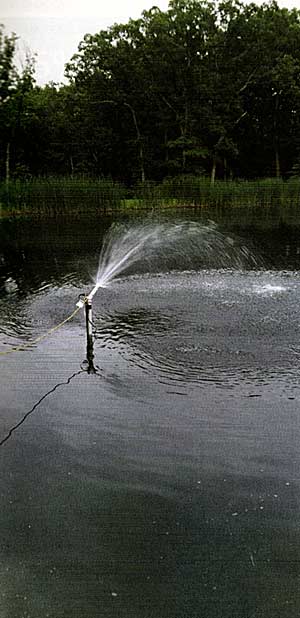
I asked him some direct questions. When the Queen heard his fish dilemma, she turned her head back to the task and guided the older boy as I regained a headlock on the littlest one, so I could talk. She sensed the urgency.
"Chuck, tell me about the weather."
I pay attention to the weather a lot. I knew they'd had significant rains, and a low-pressure system had just pushed through the area. The weather was exploiting most of Texas and Oklahoma and points east, all the way to the Atlantic.
Chuck said the temperature had been in the eighties for several days and was now in the low 50s.
I asked if the water had an odor. It did, a musty, stale odor, and the water didn't look healthy. Instead, it had darkened, almost like tea.
After a couple more questions, I knew what was going on.
It can happen to you, dear pondmeisters.
When the water warmed up, his pond stratified. We'd talked several times, and I'd even told him on my live broadcast that it was time to buy and install an aeration system. When fish biomass finally exceeds the water's ability to process organic matter and waste, you are primed for a fish kill. In Chuck's case, his pond turned over. We've all heard this term, but this was a classic living, breathing, real-world example.
"Chuck, your pond has turned over, and you need to fix it right now. Don't wait". As I explained it to him, I could hear his breathing escalate, and I sensed his heart rate ramp up.
The little grandkid had pulled free again, was on top of the couch, poised to jump off the ropes and body slam me into submission.
I told Chuck to stop what he was doing, head to the nearest home improvement center, and buy a sump pump. He interrupted. "I have one."
Great! I instructed him to screw four feet of PVC pipe into the outlet side of the pump, add a 45-degree coupling, choke the pipe down to an inch, put it in the bottom of a five-gallon bucket, submerge it three feet under water and plug it in and shoot water to the middle of the pond. The mission was to start picking up as much water as possible and shove it into the air to communicate with the atmosphere.
That would do two things. First, it would relieve gases from the anoxic layer mixed with his healthy, rapidly-degrading upper layer of water. Second, it would allow his water to absorb oxygen from the air.
The next few days would tell the tale if it worked.
Chuck said, "I did order an aeration system. It was shipped to Straatman's."
Great...but I stopped short of asking him to break into his favorite feed store and snag it late on a holiday night.
I stayed the course and told him to pump water immediately, get that aeration system we'd discussed for almost a year, and get it going. That would be his long-term solution. But, for now, we were jump-starting the situation like a battery-dead truck on the shoulder of an interstate highway.
Here's what happened to him...and it can happen to you.
New pond, new fish, clean, happy water. Feed fish, fish grow, happy water...two to three years later. Time rolls, fish grow, water less happy. Fish big, water deteriorating, we don't realize it. Fish giant, have names, eating well. Weather event, water screams for help by releasing its gases, sending fish for cover they can't find, and your pond guy gets the call on a holiday Friday...or in church on Sunday.
As a pond ages, your role as a steward is to recognize what your fish and vegetation are doing to your water. Every pond has what we call carrying capacity. When carrying capacity is reached, the water is taxed. More waste and organic matter are coming into the water than the water can process in a reasonable time. Fish metabolize the feed and give off their wastes. Plants grow, die, break down, and the water must deal with it. Much of that organic matter, including fish waste, is heavier than water and tends to sink. Toss in the proverbial plankton bloom, and we have the makings of a problem. Water below the thermocline is the recipient of that heavy load, and its shoulders aren't often wide enough to bear the load, especially in years 4, 5, or 6. That's what happened to Chuck Brinkmann. With years of feed input and astonishing growth and super feed-conversion rates, the water absorbed and digested as much as it could.
With a few years on it, your pond deserves a boost...aeration.
How did it end for Chuck Brinkmann? He got the pump going and smelled that mildewy odor for a few days. I told him to run the sump pump for three or four days. At last check, on June 9, he was still running it, but his bottom-diffused aeration system was installed and introduced per the manufacturer's instruction.
He counted nine dead bluegills, harvested several giant channel catfish, and it took about four or five days before the rest of his fish began to act normally again. Then, his water color changed, the odor disappeared, and this event ended.
By Sunday that weekend, no fish were at the top. But, by the end of Monday, bluegills had moved back onto their spawning beds, doing what they do.
Sunday for us?
The biggest grandpeep had mastered the task of convincing us to let him stay up late. The littlest one figured out how to do a pile-driver, iron claw, and a modified half-nelson on Papa.
It seems several of us got some lessons last Memorial Day Weekend.
Reprinted with permission from Pond Boss Magazine

